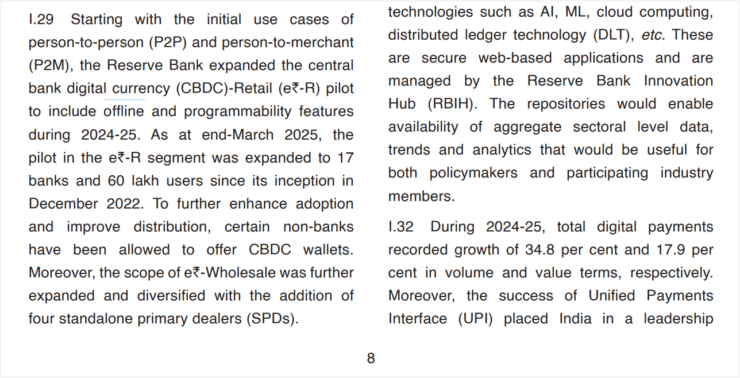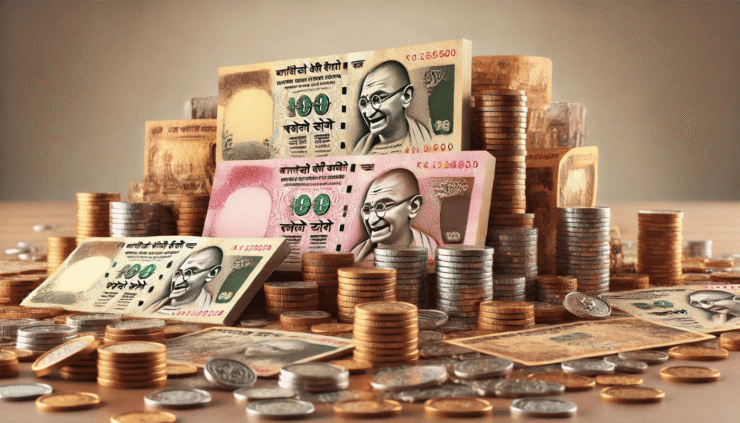The Reserve Bank of India (RBI) is significantly expanding its central bank digital currency (CBDC) initiatives by introducing advanced features and broadening stakeholder access. According to the RBI’s annual report for 2024–25, the digital rupee will soon support offline payment functionality and programmable features, aimed at boosting financial inclusion and enabling tailored use cases.
Programmability will allow the digital rupee to support targeted spending—such as conditional corporate disbursements or welfare payouts with embedded restrictions. Meanwhile, offline access will enable transactions in remote or underserved regions with poor or nonexistent internet coverage, making the CBDC more viable for India’s vast, diverse population.

On the retail side, the pilot now includes 17 banks and has expanded to serve more than 600,000 users. In a notable move toward open infrastructure, the RBI has authorized select non-bank entities to issue and manage digital rupee wallets, marking a shift toward broader ecosystem participation.
The wholesale version of the CBDC is also evolving. Initially launched for interbank settlements, it now includes four additional standalone primary dealers (SPDs), reflecting rising institutional interest and growing financial market utility.
India’s dual-track approach—developing both retail and wholesale pilots—places it among the most ambitious CBDC efforts globally. As other central banks trial similar frameworks, India’s layered strategy may shape how emerging markets approach digital monetary infrastructure.
UPI Fuels India’s Global Lead in Real-Time Payments
India’s digital finance revolution is accelerating, with the RBI reporting sharp increases in both digital transaction volume and value in 2024–25. Digital payments rose by nearly 35% in volume and over 17% in value, according to the central bank’s latest report—highlighting the country’s rapid shift toward cashless transactions.
At the heart of this transformation is India’s Unified Payments Interface (UPI), now the dominant force in global real-time payments. The RBI noted that UPI accounted for 48.5% of all global real-time transactions by volume, cementing India’s leadership in digital payment infrastructure.
To expand digital inclusion, the RBI introduced features aimed at underserved users. One such feature is Delegated Payments, allowing a primary account holder to authorize another person—such as an elderly family member or dependent—to conduct UPI transactions within defined limits. This innovation makes digital commerce accessible even to non-tech-savvy individuals.
These user-friendly tools are also laying the groundwork for the integration of CBDCs into mainstream payment systems. As India fine-tunes the digital rupee and continues scaling UPI, their convergence may offer a blueprint for other nations aiming to modernize their monetary ecosystems.
Supreme Court Demands Clear Crypto Regulation
India’s Supreme Court has pressed the federal government for answers on its continued failure to establish a clear legal framework for digital assets—despite reaping sizable tax revenues from the sector.
During a May 20 hearing, Justice Surya Kant criticized the lack of formal regulation while warning about the rise of a “parallel economy” driven by cryptocurrencies like Bitcoin. He cautioned that unregulated digital asset activity could threaten India’s financial system.
Since April 2022, Indian authorities have imposed a 30% capital gains tax on crypto trades, but the court questioned why this fiscal approach hasn’t been matched by investor protections or regulatory oversight.
With more than 100 million Indians estimated to hold crypto, the court’s comments highlight a growing disconnect between government taxation and consumer safeguards—underscoring urgent calls for a balanced, transparent policy on digital assets.
Quick Facts
- RBI plans to roll out offline CBDC functionality and programmable payments.
- 17 banks and over 600,000 users are now part of the digital rupee pilot.
- India’s UPI system accounts for nearly half of all global real-time payments.
- Delegated UPI payments allow authorized users to transact on others’ behalf.
- India’s Supreme Court demands regulatory clarity amid steep crypto taxes.





